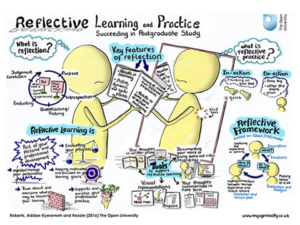
Dr Eric Addae-Kyeremeh is Associate Head of School for Education, Childhood, Youth and Sport in the Faculty of Wellbeing, Education and Language Studies
The sun is out in its full glory and beaming into my garden on this beautiful July afternoon. The birds are chirping and tweeting and a quick check on my Twitter feed suggests lots of humans are tweeting too. The two pigeons who’ve been my guests for the last few months are moving freely from one tree branch to the other, as if to say they are enjoying the weather too. On this warm day in Northampton, I reflect on a topic I’ve written and spoken about in the past and often incorporated into my teaching – Refection. This time, I will also look at reflective dialogue and how the Student Hub Live (SHL) sessions and community provide a great platform and opportunity for this. I’d start by reminding us about the importance of reflection.
Why REFLECTION?
Refection as used in something known as ‘reflective practice’ which is often traced back to the work of Dewey and Schön. Dewey (1910, p. 6) wrote that reflective practice refers to ‘the active, persistent and careful consideration of any belief or supposed form of knowledge in the light of the grounds that support it’. Dewey went on to say that being reflective ‘enables us to direct our actions with foresight … It enables us to know what we are about when we act’.
We all have a tendency to reflect on things, and so reflective practice is about taking some of those skills and using them in a slightly more formal way in order to develop professionally and academically. Practising reflection requires you to have a questioning approach, so, you consider why things are as they are, and how they might be, learning from your own experience and that of others, to effect change (e.g. focusing on future outcomes and actions). With that in mind, and based on my own research, you could say reflecting on your practice could include any or all of the following:
- practice-based learning (reflection integral to specific practice-based vocations, for example in nursing and teaching)
- action research, action learning (learning by doing) and exploratory practice
- problem and enquiry-based learning approaches
- peer-based learning (peer feedback and review)
- reflecting on the study experience.
(Addae-Kyeremeh and Rezaie, 2017)
Many of us who are in work at the moment will often hear others say, ‘you have to be reflective’ or ‘I’m quite reflective’. What this actually means is taking a moment to step away from what we are doing and asking ourselves why we’ve taken certain actions and decisions, and what we could do differently under certain conditions. Or sometimes, celebrating something we’ve done well individually or with others and thinking about how we could share the actions that led to such success.
 I developed this infographic with two colleagues to illustrate our ideas about reflection as practitioners from three different fields/vocations. In it we have tried to unpack a cycle of reflection which we argued should lead to some action. We introduce you to a reflective framework and some tools that can help facilitate reflection – as a formal process. What we hope everyone takes away from this infographic is that reflection is part of the learning and that it is a process where the learner (the ‘reflective practitioner’) stops to think about their practice, consciously analyses their decision-making, draws on theory and evidence, and relates this to what they do in practice. A reflective practitioner considers how a particular issue relates to their own practical experience – does it support, challenge, or undermine their own practice?
I developed this infographic with two colleagues to illustrate our ideas about reflection as practitioners from three different fields/vocations. In it we have tried to unpack a cycle of reflection which we argued should lead to some action. We introduce you to a reflective framework and some tools that can help facilitate reflection – as a formal process. What we hope everyone takes away from this infographic is that reflection is part of the learning and that it is a process where the learner (the ‘reflective practitioner’) stops to think about their practice, consciously analyses their decision-making, draws on theory and evidence, and relates this to what they do in practice. A reflective practitioner considers how a particular issue relates to their own practical experience – does it support, challenge, or undermine their own practice?
Reflective dialogue
Now let’s turn our attention to reflective dialogue, which is defined by Voelker (2020) as a kind of discussion that facilitates creative group discussion, expanding capacity for listening and cultivates individual reflections. I’m sure you’d agree that we all need this in our social and professional lives and therefore a practice we should all embrace. However, not everyone gets the opportunity or takes the time to engage others in critical dialogue. For more on critical dialogue visit David Voelker’s blog http://davidjvoelker.com/reflective-dialogue/.
Here at the Open University, the Student Hub Live platform and activities are a fantastic opportunity to engage with your peers and the academic community in reflective dialogue. Mercer (2008) suggested that this type of engagement and conversations are great ways in which knowledge is exchanged and developed to enhance understating and problem solving. Whilst some OU students value solitary learning, it is worth mentioning that Independent learning alone is not enough to become an independent learner. I did my second masters degree and doctorate with the OU and always valued the opportunity to engage with peers in critical and reflective dialogue. We challenged each other in a respectful way and, through what we call professional conversations, drew inspiration from each other. I encourage all students to engage with SHL activities and develop the friendships and build on your learning community.
Until I see you at the next SHL event, I’d say Good Luck – keep reading and learning but add some fun to your life too.
References:
Addae-Kyeremeh, E. and Rezaie, P. (2016) ‘Succeeding on Postgraduate Study’ [Online free course]. Open University https://www.open.edu/openlearn/education-development/succeeding-postgraduate-study/content-section-overview?active-tab=description-tab
Dewey, J. (1910) How We Think, New York, DC Heath.
Mercer, N. (2008) ‘Developing Dialogues’ in Wells, G. and Claxton, G. (eds) Learning for Life in the 21st Century: Sociocultural Perspectives on the Future of Education. Wiley: pp.141-153
Voelker, D. (2016) Reflective dialogue. [Blog post] http://davidjvoelker.com/reflective-dialogue/.
